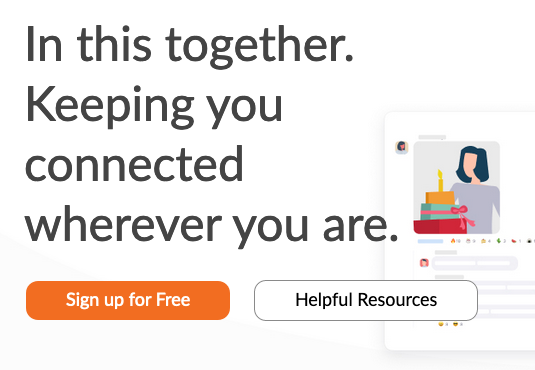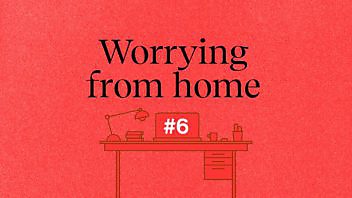In WFH post #2, B2B Marketing in COVID-19 Times, I mentioned how, in the first few days of the crisis, we made the mistake of doing marketing that ignored the world’s biggest news and pretended it was just business-as-usual.
If you remember (you… didn’t read it, did you?.. sheesh), I decided to post a normal Monday blog post that had nothing to do with the world crashing and everything to do with… B2B content marketing.
I felt a fool at the time. (No biggie. One of the upsides of actually being a fool is that this feeling isn’t so distressing any more.)
But as I’ve been closely monitoring the marketing I see every day, I’m starting to notice something that I would not have predicted: I’m not resenting a lot of ads that are just… ads.
Even just a few days ago, I felt like any company still happily flogging, say, procurement management software, must have been created by a marketing team working so remotely (Neptune?) that the news hadn’t hit them yet.
Kind of like light that’s just reaching us from a long-dead star: some planner somewhere must have pressed ‘Play’ on the media plan and then ran home to self-isolate.
But I feel like that ‘business-as-usual’ bafflement and resentment are changing already.
Weirdly, I’m starting to not just accept this normal marketing in abnormal times…
I’m starting to actually feel comforted by it.
Maybe it’s because it reminds me of happier, less anxious times.
Or because it hints at an eventual return to the world we loved but didn’t love enough to actually notice we loved.
Or maybe because I’ve been on enough calls about the question, “What do we actually DO right now?” that I have real sympathy for fellow marketers trying to figure this thing out on the fly.
But also I’m starting to think that continuing to market things in the normal way—without any reference at all to ‘the crisis’—will often be the best strategy for many brands and situations.
Clearly not for every brand or every situation (what tactic is?).
But, increasingly, business-as-usual marketing may be the best of some not-very-good options.
For one thing, people are getting sick of every communication starting with “In these uncertain times…” or “In times of crisis…”.
We know.
We really, really know.
Maybe it’s better to just skip that bit.
Because it’s starting to feel like bandwagon-jumping. (Like cramming frickin’ AI into everything you say).
(Ardath Albee reacted that way to this very series. She’s sick of sick and wants to get back to talking about marketing. I hear you, Ardath, but, um, I’m kinda committed to this.)
For another thing, a whole lot of products and services have nothing at all to do with “these uncertain times”.
Relevance is relative
If your products don’t help us work remotely; and they don’t kill germs or help us kill time; and they don’t ventilate lungs or protect first responders… then, please, don’t pretend that they do.
If your products are just business-as-usual products, then maybe business-as-usual marketing is just fine.
You still need to sell stuff and—though they may have other priorities right now—people may still need to buy that stuff.
If your products do indeed relate to the new challenges your customers and prospects are facing, then you have another set of considerations and challenges. Like figuring out where the ‘tone-deaf’ lines are drawn today and where they’re likely to be drawn tomorrow.
Or what you can do with your newfound fortune to actually help customers, prospects or just people in distress.
Zoom keeps it real
If your actual products can help folks right now, you have a right to say so. Just try not to look too happy about it.
I like how Zoom is handling it. The three rotating banners on their home page carousel hit the right notes:

Okay, the “In this together” line might attract some inbound Twitterhate (“Yeah, we’re in it together but some of us just lost our businesses and some of us just saw our business quintuple”). But it’s simple, straight and true.

Helping event organizers move their events online is a sweet spot. It’s relevant and Zoom has lots of content to help. Also:

I really like this one because Zoom isn’t just promoting a service that helps schools, it’s doing something to help schools.
Doing beats talking
That’s one of the core principles from WHF # 4, Three Principles For Marketing In Insane Times: It’s not what you say in a crisis, it’s what you do in a crisis.
If you’re one of the lucky products or services that are booming right now, it’s a great time to give some of that bonus profit back.
If you can forego some revenue to help people cope, now’s the time to do it.
And, remember, you don’t have to give everything away to everyone. You can pick people who are especially needy (like small businesses) or vulnerable (like old folks) or deserving (like midwives) and be super generous with them.
I’m seeing tons of this kind of generosity right now and it makes me proud of my species (a feeling I haven’t felt in three-ish years).
So if you’re a marketer in a company that can really do some good, stop “marketing” and argue hard for doing that.
But if you’re in a company whose products and services aren’t particularly relevant or crisis-worthy…
Then maybe it’s okay to do good things for charities and your community… and just get back to good old, honest, no-hidden-agenda marketing.
Thoughts?
—-
—
–
NOT-FOR-PROFIT AD BREAK:
The COVID epidemic is just hitting countries with very low literacy levels. Getting people in these countries the information they need to protect themselves is critical to saving lives and flattening the curve.
But most COVID-19 information (about things like hand-washing, self-isolation and social distancing), is only available in a few languages—and in written form—so it can only reach a small percentage of these vulnerable populations.
Translators Without Borders exists to close these communication gaps.
They translate. They monitor social media to help fight misinformation. They create visual and audio communications. They train local interpreters. They build medical glossaries and language resources.
Now they’re doing it for the WHO, Save The Children and lots of grassroots, community aid organizations. But they’re overwhelmed.
This is incredibly important work and TWB needs your help to surge resources to meet the global demand.
Please donate here.
–
(Sorry for ambushing you in our blog. Had to be done.)

Enjoyed this article?
Take part in the discussion








Comments
Disha April 9th, 2020
I was starting to feel guilty about being okay with all the “normal marketing” happening — glad I’m not alone.
Oh, and it’s sad to see so many companies write about it just for the sake of it. Not sure if they realize how desperate they’re looking right now.
Doug Kessler April 20th, 2020
Thanks, Disha. It’s tricky to know how to play it. I feel like the first wave of “We have to say SOMETHING.” has passed and now marketers are being more thoughtful about whether that’s true and, if so, what the right things to say are.
Craig Lindberg Spark B2B Marketing April 14th, 2020
I couldn’t agree more Doug. In fact many companies Covid-19 ads are so over the top w the ‘thanks to our front liners’ that it seems contrived, leaving the impression of being disingenuous or worse; opportunistic pandering to gin goodwill for commercial gain. Yeeech.
Doug Kessler April 20th, 2020
Thanks, Craig. I’d love to study that danger zone, where a message can come off as sincere and well-considered but is equally likely to be called out for phony pandering.
I think we all feel we have good bullshit detectors but when I monitor my own responses, they’re not always rational. Might be as much to do with my mood as their wording — I just don’t know.